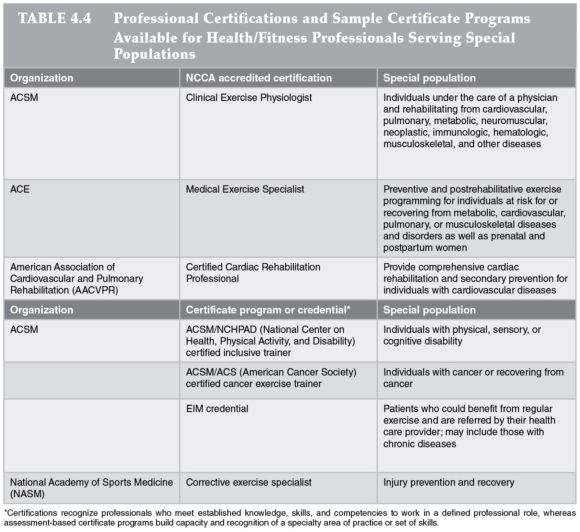Guidelines for health/fitness facility professional staff and independent contractors
This is an excerpt from ACSM's Health/Fitness Facility Standards and Guidelines-5E by Mary Sanders.
Box 4.2 Guidelines for Health/Fitness Facility Professional Staff and Independent Contractors
- Facility operators should consider having health/fitness professionals who have the appropriate level of professional education and/or certification conduct assessments with and prescribe physical activity for individuals with special needs.
- Facility operators should consider having all staff members trained and certified in cardiopulmonary resuscitation and AED administration.
- Facility operators should perform criminal background checks on all employees and independent contractors.
- Facility operators should include clear policies on discrimination and on the prohibition of unlawful harassment in their employee handbooks.
Professional staff and independent contractor guideline 1. Facility operators should consider having health/fitness professionals who have the appropriate level of professional education and/or certification conduct assessments with and prescribe physical activity for individuals with special needs.
Over the past 5 to 10 years, an ever-increasing number of individuals with health conditions that limit their ability to safely participate in physical activity programs are engaging in services offered by health/fitness facilities. A 2017 IHRSA Health Club Consumer Report survey found that 12.8% of club members were over the age of 65, and another 26.2% were within the ages of 45 to 64. This data represents a significant number of members who are aging and may be more likely to have one or more medical conditions (such as diabetes, heart disease, cancer, hypertension, COPD). It is also not uncommon to find members and users with physical disabilities (such as blindness or loss of mobility in one or more limbs) participating in exercise programs under the supervision of health/fitness professionals. In these instances, it is prudent for health/fitness facility operators to consider having the health/fitness professional demonstrate the proper level of professional competency, as evidenced by the appropriate professional education and/or certification. In recognition of the benefit of connecting health care providers with qualified fitness professionals, ACSM developed an Exercise is Medicine® (EIM) credential, as part of its overall Exercise Is Medicine initiative. This credential prepares fitness professionals at various levels to effectively communicate with health care providers, to be easily accessible as part of the EIM database, to manage patient referrals, and to provide exercise guidance to patients, potentially including those individuals with chronic disease who have been cleared for exercise. Table 4.4 provides examples of several industry certifications and certificate programs for health/fitness professionals who are working with different special populations.

Professional staff and independent contractor guideline 2. Facility operators should consider having all staff members trained and certified in cardiopulmonary resuscitation and AED administration.
SHOP

Get the latest insights with regular newsletters, plus periodic product information and special insider offers.
JOIN NOW


